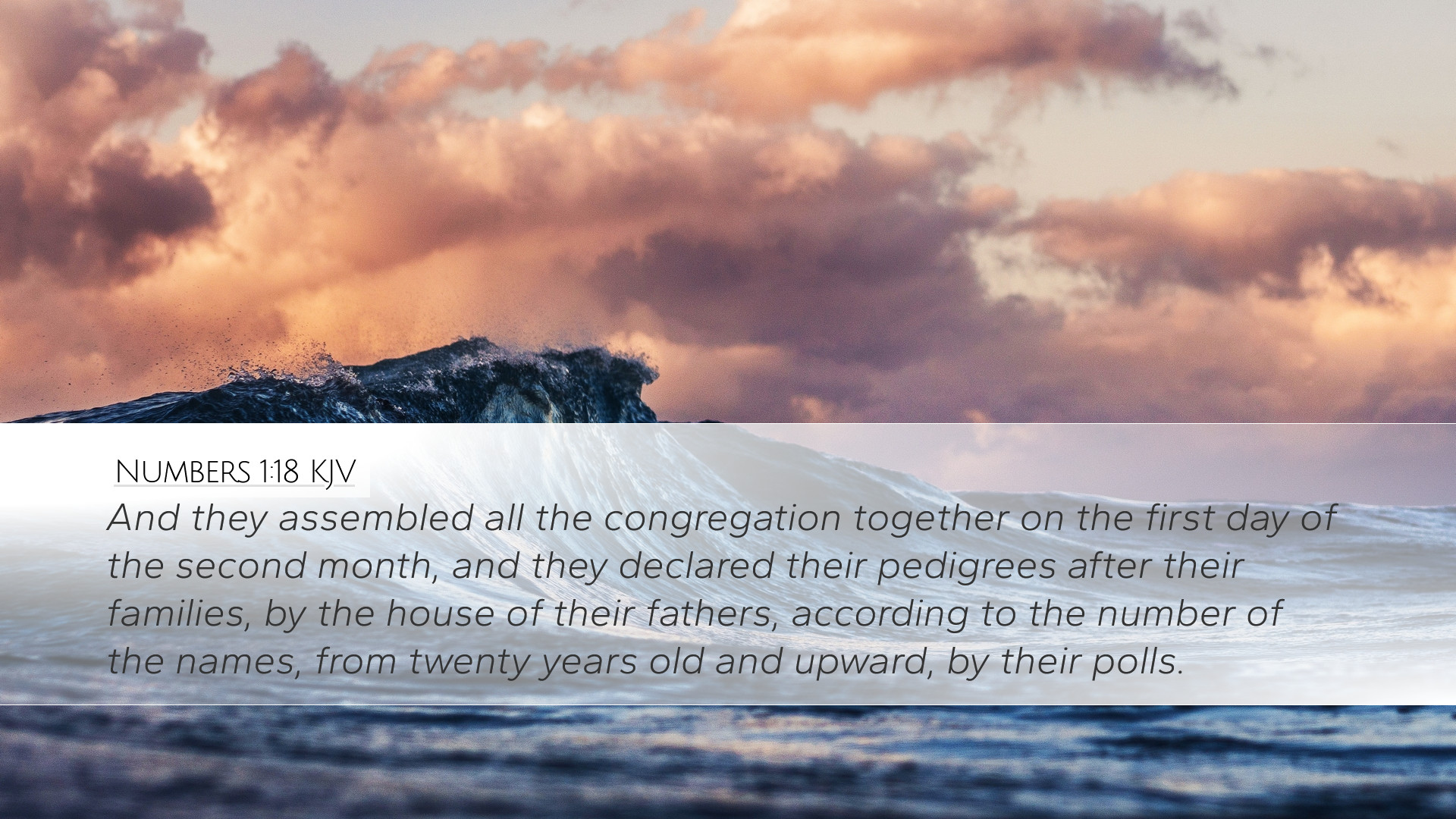Bible Commentary on Numbers 1:18
Introduction
Numbers 1:18 states: "And they assembled all the congregation together on the first day of the second month, and they declared their pedigrees after their families, by the house of their fathers, according to the number of the names from twenty years old and upward, by their polls." This verse marks a significant moment in Israel's history as it sets the stage for the census-taking that would lead to the establishment of order and organization within the Israelite camp.
The Context and Purpose of the Census
It is crucial to understand the broader context of this verse within the Book of Numbers. After the Israelites' exodus from Egypt and their journey in the wilderness, God commands Moses to take a census of the people. The census reflects God's concern for the organization and welfare of His people. As commented by Matthew Henry, "God is a God of order; and here, to avoid confusion, He would have the people numbered." This organized structure is vital for their military preparedness and tribal assignments.
The Assembly of the Congregation
The assembly on the first day of the second month signifies the importance of communal participation in this divine directive. Albert Barnes notes that "the gathering of the people illustrates the unity of the nation," emphasizing that each individual play a part in the larger body of the Israelite community. The term "congregation" used here indicates the significance of collective identity among the Israelites, highlighting that their identity came from being part of God's chosen people.
Genealogies and Family Structures
The verse's mention of declaring "their pedigrees after their families, by the house of their fathers" speaks to the biblical emphasis on lineage and heritage. Adam Clarke elaborates on this by explaining that “family structures were vital in Israelite society; they provided stability and identity.” The organization by households establishes a system of accountability and belonging, where each tribe and family is recognized for its contributions to the community.
The Importance of Age
The specification of counting men "from twenty years old and upward" serves several purposes:
- Military Readiness: This age threshold aligns with military service, indicating that these men were those capable of bearing arms. As highlighted by Henry, “God prepared His people for warfare; hence, He required the able-bodied to be counted.”
- Growth and Maturity: This age indicates not just physical maturity but also the responsibility that comes with adulthood. Barnes explains that, "The Israelites under God’s law were to be a mature people, ready to partake in His covenant and in the defense of His promises."
- Spiritual Responsibility: The counting of men signifies their spiritual obligation to lead and facilitate worship within their families and tribes.
Spiritual Lessons from Numbers 1:18
This verse offers several spiritual insights that remain pertinent for modern believers:
- God’s Orderliness: Just as God organized His people for their journey, He calls His church to maintain order in the midst of chaos. A well-structured church community can foster growth and outreach.
- Identity in Community: The emphasis on lineage reminds believers of their identity as members of the body of Christ. Each believer plays a crucial role in God’s plan and mission.
- Responsibility and Service: The focus on the able-bodied men speaks to the importance of being equipped for service in God’s kingdom. Christians are encouraged to recognize their gifts and serve diligently.
Conclusion
Numbers 1:18 encapsulates essential themes of identity, order, responsibility, and community within God’s chosen people. As pastors, students, theologians, and Bible scholars reflect on this verse, they should draw connections between the organizational structure God instituted for Israel and the diverse, yet united nature of the Church today. The insights from Matthew Henry, Albert Barnes, and Adam Clarke collectively invite deeper contemplation on how God values order and identity among His people, encouraging believers to participate actively in the life of the church as a reflection of their commitment to God's purposes.


